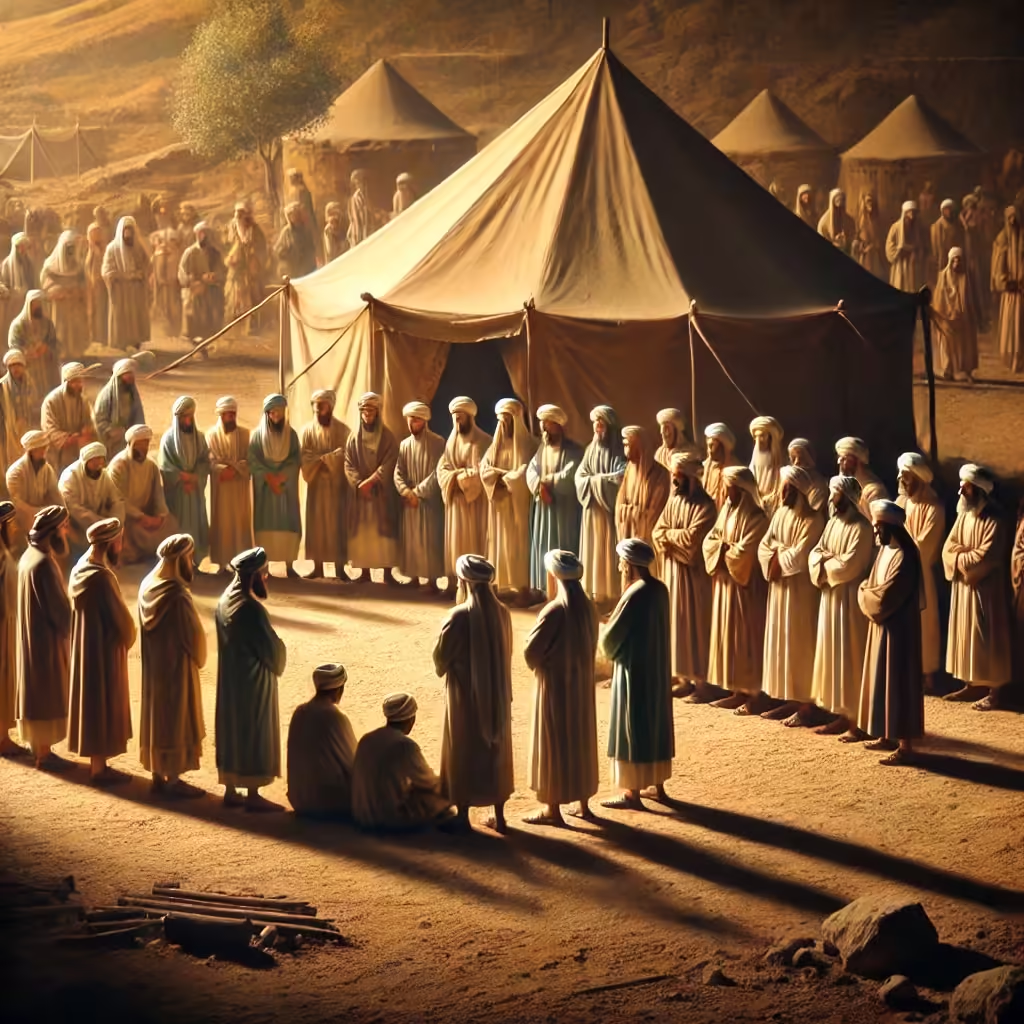Table of Contents
Introduction
This article is the third part of the series “In the Brightened Corridors of the Prophet’s Life Story“. This article explores the vital aspect of protecting the leader as seen in the life of the Prophet (Peace be upon Him). It reflects on the dedication of the companions (may ALLAH be pleased with them) in safeguarding the Prophet (Peace be upon Him). Click here to read the complete series, ALLAH willing.
Understanding the Value of Leader Protection
In this article, we address an often-overlooked topic: the importance of protecting the leader. In today’s world, we sometimes encounter unrealistic and misleading ideas, such as “if one leader is lost, a thousand others can replace him.” Statements like these are fundamentally flawed, as a true leader is, by nature, a rarity—a unique figure. It is rare for one leader to be replaced by another of equal caliber. More often than not, when a leader departs, there is no true replacement.
Leader Protection in the Prophet’s (Peace be upon Him) Early Mission
This principle was well understood by the Prophet (Peace be upon Him) and deeply ingrained in the minds of his companions, as shown from the earliest days of His mission during the Meccan period. In those days, the Prophet (Peace be upon Him) was under the protection of His tribe, Banu Hashim, as Arab society was founded on a system of tribal alliances. No tribe could harm a member of another tribe without risking a larger conflict.

The Quraysh repeatedly attempted to negotiate with Abu Talib, the Prophet’s (Peace be upon Him) uncle and the leader of Banu Hashim, to silence Him, hand Him over, or even trade Him. On one occasion, they offered Abu Talib the strongest young man from Quraysh, Umarah bin Al-Walid, saying, “Here is the strongest youth of Quraysh; take him and give us Muhammad in return. It’s just an exchange—one man for another”. Abu Talib responded firmly, “What a terrible proposal! You want me to give you my son so you can kill him, while you offer your son for me to raise in His place?”1
Divine Protection and Tribal Support
The Prophet (Peace be upon Him) was under the protection of His people from the beginning of His mission, which is why He (Peace be upon Him) said,
“ALLAH never sent a Prophet except within the protection of His people”2
This concept is also mentioned in the Quran:
“They said, “O Shuʿayb, we do not understand much of what You say, and indeed, we consider You among us as weak. And if not for Your family, we would have stoned You [to death]; and You are not to us one respected“3
(Suraat Huud, 11:91)
ALLAH, the Most Glorified and Exalted, sent prophets only after ensuring they had protection, enabling them to deliver HIS message to the people.
The Migration Period and Strategic Protection
When Banu Hashim discovered that Quraysh had conspired to assassinate the Prophet (Peace be upon Him), Abu Talib gathered the clans of Banu Hashim and Banu Abd Al-Muttalib and took them to the valley known as the Valley of Abu Talib, where they could protect the Prophet (Peace be upon Him). This act of solidarity led to the famous siege.
There are many incidents to recount, but here we are taking brief glimpses. Later, we see Ali ibn Abi Talib (may ALLAH be pleased with him) sleeping in the Prophet’s (Peace be upon Him) bed during His migration. Ali’s presence in the Prophet’s bed played a crucial role in misleading the Quraysh, who were intent on killing Him. Ali slept in the Prophet’s place while the Prophet (Peace be upon Him) departed on His journey of migration.
During the migration journey, we see that Abu Bakr (may ALLAH be pleased with him) was deeply concerned with safeguarding the Prophet’s (Peace be upon Him) life. The books of biography tell us that he would sometimes walk in front of the Prophet (Peace be upon Him), sometimes behind Him to watch His back, and at other times on His right or left, constantly shifting to ensure His safety. When they arrived at the cave of Thawr, Abu Bakr entered before the Prophet (Peace be upon Him) to clean it and to check for any scorpions, snakes, or other creatures that could pose a danger.
The Prophet (Peace be upon Him) asked, “What troubles you, Abu Bakr?” to which he responded,
“O Messenger of ALLAH, I am but one man”4
By this, he meant that if he were harmed, it would only be the loss of one person; however, if harm came to the Prophet (Peace be upon Him), it would mean the endangerment of the entire faith. Thus, Abu Bakr (may ALLAH be pleased with him) took on the role of not only a devoted companion but also a vigilant protector of the Prophet (Peace be upon Him).
Protecting the Leader in Medinah
When the Prophet (Peace be upon Him) arrived in Medinah, the Ansar came out to greet Him, fully armed. According to narrations in the biographies, the people rushed to Him with weapons, and as the Prophet (Peace be upon Him) continued on His mount, each group would say, “O Messenger of ALLAH, stay with us; you will find strength, resources, and people ready to support You”.
They understood that protecting the Prophet (Peace be upon Him), as the leader of the Islamic state and the guide of this community, was their top priority to ensure no harm reached Him. The Prophet (Peace be upon Him) responded, “Let her proceed, for she is commanded”5, allowing His mount to guide Him until it stopped at the place that would become Abu Ayyub’s house. Later, the Prophet (Peace be upon Him) moved to a house beside what would become the Prophet’s mosque.
During this time, the companions remained vigilant, understanding the critical need to protect their leader. The Prophet (Peace be upon Him) even had guards at His door each night, ensuring His safety. This continued until ALLAH, the Most Glorified and Exalted, revealed,
“…And ALLAH will protect you from the people…“6
(Suraat ‘Al-Maa’idah, 5:67)
With this assurance, the Prophet (Peace be upon Him) dismissed His guards.
Protecting the Leader: The Attempted Assassination of the Prophet (Peace Be Upon Him)
As we reflect on the biography of the Prophet (Peace be upon Him), we find numerous instances where He had guards at His door, managing who was allowed to enter, with the Prophet (Peace be upon Him) either granting or denying access.
One well-known incident involves an assassination attempt by Umayr ibn Wahb Al-JumaHi, infamously known as the “Satan of Quraysh”. This occurred after the Battle of Badr, when Quraysh’s army had suffered defeat and Umayr’s son was taken captive. In response, Umayr made a pact with Safwan ibn Umayyah to assassinate the Prophet (Peace be upon Him), even though it resembled a suicide mission. Safwan pledged to support Umayr’s family and children in his absence.

Determined, Umayr took his sword and laced it with poison so that even a small wound would allow the toxin to enter the Prophet’s (Peace be upon Him) body, ensuring a fatal outcome. But when he arrived, he found guards stationed in front of the Prophet (Peace be upon Him). Umar ibn Al-Khattab noticed him and said, “Umayr ibn Wahb, Satan of Quraysh, what brings you here?” Umayr replied, “I came to ransom this prisoner”, referring to his son. Umar then questioned him about the sword at his side, to which he responded, “May ALLAH curse these swords—did they serve us in any way on the day of Badr?”
This exchange revealed the companions’ vigilance in protecting the Prophet (Peace be upon Him) from potential threats. When the Prophet (Peace be upon Him) allowed Umayr to enter and then disclosed the details of his secret agreement with Safwan ibn Umayyah, Umayr was astonished. Realizing that only ALLAH, the Most Glorified and Exalted, could have revealed this private conversation, Umayr accepted Islam on the spot and embraced the faith wholeheartedly.
The Essential Role of Leader Protection in Islamic Revival and Leadership
Anyone who studies the biographies will find countless examples of individuals who stood guard at the Prophet’s (Peace be upon Him) door, serving as gatekeepers and allowing people to enter only with His permission. The protection of a leader is one of the most vital and prioritized aspects in every journey of revival, in every nation’s progress, and in every movement or call to faith. Once a true leader is lost, he cannot simply be replaced, as true leadership is a unique and rare quality.
We ask ALLAH, the Most Glorified and Exalted, to teach us what benefits us, to grant us benefit from what we learn, and to increase us in knowledge.
Sources:
- Mohamed Elhamy. محمد إلهامي | في أروقة السيرة | 3. حراسة النبي ﷺ. YouTube Video.

